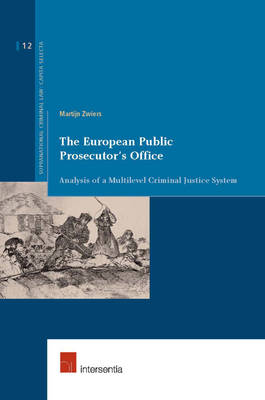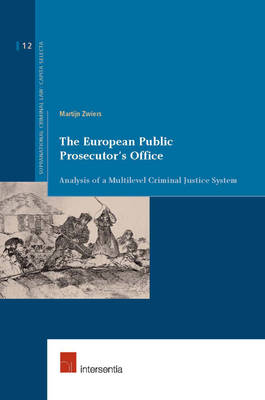
- Afhalen na 1 uur in een winkel met voorraad
- Gratis thuislevering in België vanaf € 30
- Ruim aanbod met 7 miljoen producten
- Afhalen na 1 uur in een winkel met voorraad
- Gratis thuislevering in België vanaf € 30
- Ruim aanbod met 7 miljoen producten
Zoeken
The European Public Prosecutor's Office
Analysis of a Multilevel Criminal Justice System Volume 12
Martijn Zwiers
€ 125,95
+ 251 punten
Omschrijving
After years of debate, the Treaty of Lisbon introduced a legal basis for the introduction of a European Public Prosecutor's Office in article 86 TFEU. This provision indicates that the Council may establish this new Office from Eurojust, and that it would be competent to combat crimes affecting the financial interests of the European Union and serious cross-border crime. However, this provision leaves more questions than it answers. In particular, questions related to the way the Office may be embedded in the EU's institutional structure. Such questions are addressed in this study. The book comprises a broad discussion of the Member States' prosecution services, the EU's institutional context, Eurojust, direct enforcement in the field of competition law by the European Competition Network, and proposals on the structure of the Office that were drafted prior to the entering into force of the Treaty of Lisbon. It is concluded that the European Public Prosecutor's Office will probably be constituted as a Council-oriented, multi-level network. It will likely consist of a European-level parquet that will exercise a measure of authority over national authorities. However, to an important extent, it will depend on the national prosecution services and the national police forces for its actual investigative and prosecutorial activities. There will not be a US-style federal European Public Prosecutor's Office and federal police force. One of the key issues addressed is the democratic accountability of the Office. It is argued that a semi-independent Office is the preferred model, placed under a duty to elaborate a comprehensive, transparent, and coherent prosecution policy in collaboration with the Council and other important stakeholders. The Office should be accountable to the Council and other political stakeholders for the proper execution of this policy, as well as its performance overall. Thus, both ex ante legitimacy, as well as ex post control of its activities, may be ensured. However, it is especially shown that organizing ex post control in an acceptable way will prove to be a challenge. In addition, the book also addresses more detailed issues, such as choices to be made in respect to the mandate of prosecutors acting for the European Public Prosecutor's Office and various decisions to be taken in relation to the pre-trial and trial courts. (Series: Supranational Criminal Law: Capita Selecta - Vol. 12)
Specificaties
Betrokkenen
- Auteur(s):
- Uitgeverij:
Inhoud
- Aantal bladzijden:
- 504
- Taal:
- Engels
- Reeks:
Eigenschappen
- Productcode (EAN):
- 9781780680293
- Verschijningsdatum:
- 28/10/2011
- Uitvoering:
- Paperback
- Formaat:
- Trade paperback (VS)
- Afmetingen:
- 160 mm x 240 mm
- Gewicht:
- 839 g

Alleen bij Standaard Boekhandel
+ 251 punten op je klantenkaart van Standaard Boekhandel
Beoordelingen
We publiceren alleen reviews die voldoen aan de voorwaarden voor reviews. Bekijk onze voorwaarden voor reviews.











